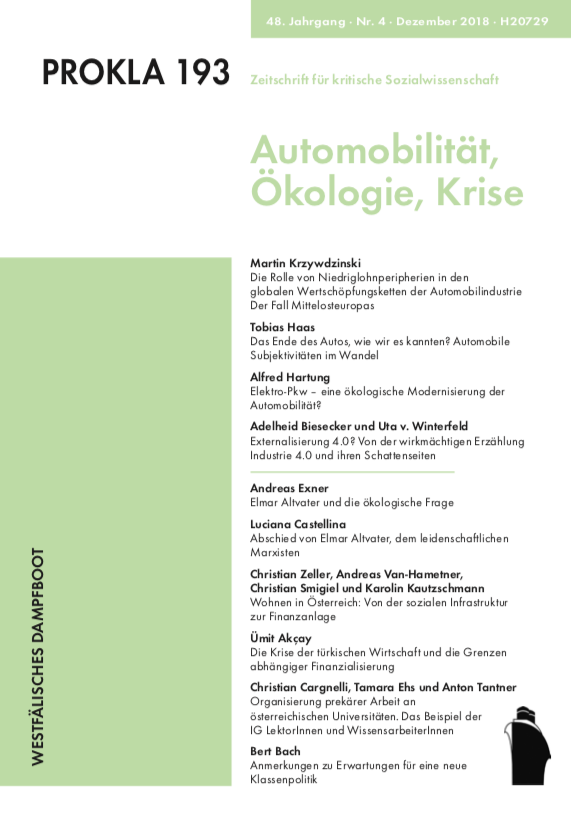Elmar Altvater und die ökologische Frage
DOI:
https://doi.org/10.32387/prokla.v48i193.1102Schlagwörter:
Elmar Altvater, Ökologische Frage, Kapitalismus, Kapitalozän, Gesellschaftliche NaturverhältnisseAbstract
The main arguments of the ecological marxism of Elmar Altvater are presented referring to key publications in their historical context. Altvater’s work on ecology starts in the 1980s, developing along a critique of the contradictory social forms of capitalist nature relations. His approach articulates world market and international politics with the spatially differentiated development of regional societal formations, capturing the materiality of nature by thermodynamic categories while highlighting the properties of fossil fuels. Contours of a critical reception of how Altvater conceptualizes societal relations with nature are outlined.
Downloads
Literaturhinweise
Altvater, Elmar (1987a): Ökologische und ökonomische Modalitäten von Zeit und Raum. In: PROKLA 17(1): 35-53. https://doi.org/10.32387/prokla.v17i67.1338
- (1987b): Sachzwang Weltmarkt. Verschuldungskrise, blockierte Industrialisierung, ökologische Gefährdung - der Fall Brasilien. Hamburg.
- (1991a): Universalismus, Unipolarität, Polarisierung. Widersprüchliche Strukturprinzipien einer "neuen Weltordnung". In: PROKLA 21(2): 345-367. https://doi.org/10.32387/prokla.v21i84.1131
- (1991b): Die Zukunft des Marktes. Ein Essay über die Regulation von Geld und Natur nach dem Scheitern des "real existierenden Sozialismus". Münster.
- (1992): Der Preis des Wohlstands oder Umweltplünderung und neue Welt(un)ordnung. Münster.
- (1994a): Die Ordnung rationaler Weltbeherrschung oder: Ein Wettbewerb von Zauberlehrlingen. In: PROKLA 24(2): 186-225. https://doi.org/10.32387/prokla.v24i95.998
- (1994b): Operationsfeld Weltmarkt oder: Vom souveränen Nationalstaat zum nationalen Wettbewerbsstaat. In: PROKLA 24(4): 517-547. https://doi.org/10.32387/prokla.v24i97.978
- (2005): Das Ende des Kapitalismus, wie wir ihn kennen. Eine radikale Kapitalismuskritik. Münster.
- (2007): Der kurze Sommer des akademischen Marxismus oder: Wie weiter mit der PROKLA? In: PROKLA 37(1): 9-24. https://doi.org/10.32387/prokla.v37i146.523
- (2013): Wachstum, Globalisierung, Anthropozän. Steigerungsformen einer zerstörerischen Wirtschaftsweise. In: Emanzipation 1: 71-88.
- (2016): The Capitalocene, or, Geoengineering against Capitalismʼs Planetary Boundaries. In: Moore, J. (Hg.): Anthropocene or Capitalocene? Nature, History and the Crisis of Capitalism. Oakland: 138-152.
- (2017a): Leerstelle bei Marx oder Ignoranz der Leser? Kapital 150, Marx 200. URL: https://marx200.org/debatte/leerstelle-bei-marx-oder-ignoranz-der-leser, Zugriff: 28.8.2018.
- (2017b): Kapitalozän. Der Kapitalismus schreibt Erdgeschichte. In: Luxemburg, Nr. 2-3: 108-117.
- /Mahnkopf, Birgit (1999): Grenzen der Globalisierung. Ökonomie, Ökologie und Politik in der Weltgesellschaft. Münster.
Bakker, Karen/Bridge, Gavin (2006): Material worlds? Resource geography and the ,matter of nature'. In: Progress in Human Geography 30(1): 5-27.
https://doi.org/10.1191/0309132506ph588oa
Brand, Ulrich/Dietz, Kristina (2014): (Neo-)Extraktivismus als Entwicklungsoption? Zu den aktuellen Dynamiken und Widersprüchen rohstoffbasierter Entwicklung in Lateinamerika. In: Politische Vierteljahresschrift, Sonderheft 48 (Theories of Development). Baden-Baden: 88-125.https://doi.org/10.5771/9783845250298_133
Bennett, Jane (2004): The Force of Things: Steps toward an Ecology of Matter. In: Political Theory 32: 347-372.
https://doi.org/10.1177/0090591703260853
Castree, Noel (2002): False Antheses? Marxism, Nature and Actor-Networks. In: Antipode 34(1): 111-146.https://doi.org/10.1111/1467-8330.00228
Dietz, Kristina/Wissen, Markus (2009): Kapitalismus und "natürliche Grenzen". Eine kritische Diskussion ökomarxistischer Zugange zur ökologischen Krise. In: PROKLA 39(3): 351-370.https://doi.org/10.32387/prokla.v39i156.419
Foster, John Bellamy (2016): Marxism in the Anthropocene: Dialectical Rifts on the Left. In: International Critical Tought 6(3): 393-421.
https://doi.org/10.1080/21598282.2016.1197787
Gehrig, Thomas (2011): Der entropische Marx. Eine Bitte an den Marxismus, die Entropie-Kirche im thermodynamischen Dorf zu lassen. In: PROKLA 41(4): 619-144.
https://doi.org/10.32387/prokla.v41i165.335
Hauff, Volker (Hg., 1987): Unsere gemeinsame Zukunft. Der Brundtland-Bericht der Weltkommission für Umwelt und Entwicklung. URL: http://www.un-documents.net/our-common-future.pdf, Zugriff: 28.8.2018.
Le Billon, Philippe/Sommerville, Melanie (2017): Landing capital and assembling 'investable land' in the extractive and agricultural sectors. In: Geoforum 82: 212-224.
https://doi.org/10.1016/j.geoforum.2016.08.011
Li, Tania Murray (2014): What is land? Assembling a resource for global investment: In: Transactions of the Institute of British Geographers 39: 589-602.
https://doi.org/10.1111/tran.12065
Marx, Karl/Engels, Friedrich: Werke, Berlin, verschiedene Jahre (zit. MEW mit Bandnummer).
Moore, Jason W. (2015): Cheap Food and Bad Climate: From Surplus Value to Negative Value in the Capitalist World-Ecology. In: Critical Historical Studies 2(1): 1-43. https://doi.org/10.1086/681007
Neusüß, Christel/Blanke, Bernhard/Altvater, Elmar (1971): Kapitalistischer Weltmarkt und Weltwährungskrise. In: PROKLA 1(1): 5-116. https://doi.org/10.32387/prokla.v1i1.1223
Ouma, Stefan (2016): From financialization to operations of capital: Historicizing and disentangling the finance-farmland-nexus. In: Geoforum 72: 82-93. https://doi.org/10.1016/j.geoforum.2016.02.003
Rosdolsky, Roman (1959): Der Gebrauchswert bei Karl Marx. Eine Kritik der bisherigen Marx-Interpretation. In: Kyklos XII: 27-56. https://doi.org/10.1111/j.1467-6435.1959.tb02137.x





